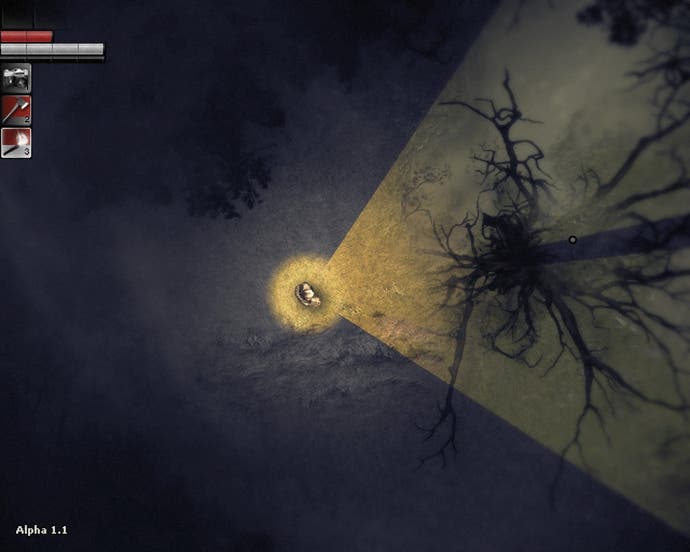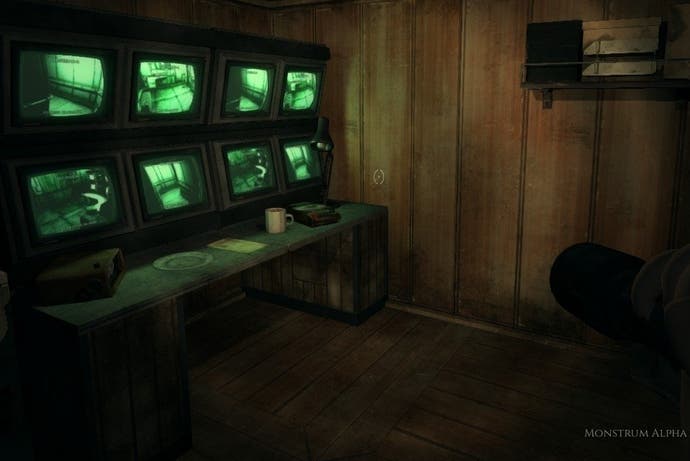The problem with fear
Darkwood and Monstrum take two different approaches to horror. How do they work out?
Tricky stuff, fear. It's a precision target. Miss by a couple of feet, and you get moody intrigue. Miss by an inch and you get all-out comedy.
Fear's particularly difficult for games, I suspect, just as, you know, all-out comedy's particularly difficult for games: for the most part a designer has to relinquish any control over timing. But is there more to it than that? I've been thinking about this sort of stuff over the last few days because I've been playing early versions of two forthcoming horror games - two games where fear is a target the designers have to hit. Both are very different, both rely on procedural generation, and both are shaping up to be excellent in their own ways. But will either truly give you the fear? So far, I'm not so sure, but I think their problems in that department are still pretty interesting.
Monstrum's the most direct of the two games. I've been playing the same alpha build that Ian Higton used for a Let's Play recently, and it's actually been the perfect point at which to encounter this atmospheric and wonderfully compact treat. Every now and then, you see a game with everything but the very core of the concept stripped away, and you think: just leave it like this. Do you actually need anything more? In Monstrum's case, I suspect a lot of what's missing is polish, thankfully. The game's recently been delayed until 2015, but I don't think that's because the developers are diluting the experience by adding RPG upgrades or card-battling mini-games.
The idea with Monstrum is that you've been dumped onto a boat, a creaking, rust-scarred ghost ship home to assorted clutter from the 1970s. Sadly, it's also home to a rampaging monster, and it's your job to sneak around the procedurally scrambled decks looking for the bits and pieces you might need to hatch an escape plan.
Straightforward as this set up is, it's brilliant in implementation, and a lot of the things that make it brilliant are things that could have sunk another game. Chief amongst them is the fact that procedurally generating layouts can often lead to a kind of anonymising effect: everything looks the same, and navigation quickly becomes confusing. For Monstrum, though, this merely adds to the claustrophobic atmosphere: another corridor studded with cheap wood-effect doors. Another clanging metal staircase. Have I been here before? Am I hopelessly lost? Am I ever going to get out? Oh, the bridge!
Threading a kind of Supermarket Sweep objective through spaces like this is a bit of a masterstroke - not that Supermarket Sweep sent a glowing-eyed heat monster chasing after its contestants. Monstrum definitely does, and the first time I saw it I fairly sluiced coffee all over myself in fright. Then I immediately got killed.
The fright had rather a short half-life, though, as fright generally does. The first time you see Monstrum's monster, it's a terrible shock. The second time, it's a bit like bumping into a colleague. Oh, you again? I'd better be running and hiding in a locker, eh? Do give a me a ten-count. This is the problem with so much horror, of course, the thing once seen, struggles to be a thing any more. Its creeping, crawling unknowable thingness has been dissipated and all that's left is the process of classification.
That's not absolutely all that's left, of course, and Monstrum copes with its unveiling moment surprisingly well, shifting you from sneaky scavenger to fleeing survivalist. I gather the final game may also throw in a range of different monsters to scramble things further. The core of Monstrum changes after that first sighting, though: on your initial playthrough, this is a horror game, and on all subsequent playthoughs it's more of a sort of panic game, or at least the current early build is. It's still excellent fun as a panic game, but it's lacking that delightful uncanny chill.
Darkwood is a very different beast, although you're still scavenging, still exploring, and still inching your way tentatively through a world that can't wait to do you in. Acid Wizard's game has just entered Early Access, and if you're willing to deal with a somewhat dodgy save function, it's a creepy treat, a top-down affair in which you explore a horrible forest, levelling up, scraping together survival kit, and watching out for a variety of ghastly creatures who want to smash you to pieces.

The team at Acid Wizard really knows what it's doing, too. From an ingenious skippable introduction that should absolutely not be spoiled here through to a dozen little details that follow, this is a masterclass in how to undermine the audience in tiny, gnat-bite ways. That's whether it's a single line of dialogue revealing that the player character knows more about the situation than the player does, or the fact that the game's map gives you an overview of the entire landscape without pinpointing your position - something I dearly hope never gets changed, despite many calls on the forums to do just that. Darkwood's all about being befuddled and compromised: this is a game that's not above dropping you into a complex world with next to no information as to how things work, and a design that uses dynamic fog of war to generate shocks and shivers from a fairly lofty overhead perspective that should have left you feeling empowered.
Just as Monstrum gives a little too much up when it shows you the man in the rubber suit, however, a morning of playing suggests Darkwood eventually eases off the tension as it becomes steadily more game-like. Even with the nameless dread and the slow-burning plot, the moment that Darkwood's disparate systems start to cohere into a recognisable framework is the moment that your pulse starts to settle somewhat. Again, it's still a very promising framework, but it's a framework you'll inherently understand - survival stuff, RPG upgrades, a day/night cycle with those attendant dangers that appear when the sun sets. The claustrophobia never goes away - and, if you're playing with permadeath enabled, there are still plenty of things to worry about - but the familiarity of the structure can't help but become a little comforting.
Comfort, it turns out, can be found in some perverse places indeed. It's no coincidence, I think, that both Monstrum and Darkwood are at their least frightening when you're actually being attacked - when that glowing-eyed heat thing rounds a corner and lunges at you, or when those wild dogs in the forest stop stalking and start to bite. It's almost a relief: Oh, I'm just being savaged. The fear, after all, is in the anticipation, the catastrophizing, the way you warp your own world when faced with the unknown. Show me the game that can draw that out indefinitely.


